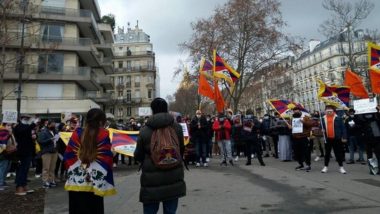Taipei, February 28: The Tibetan Uprising Day, observed every year on March 10, will mark the 62nd anniversary this year to commemorate the 1959 Tibetan peaceful uprising against Communist China's repression in the Tibetan capital of Lhasa.
According to The Taiwan Times, around the world, Tibetans and their supporters remember and pay tribute to all those who have sacrificed their lives for Tibet's struggle. Tibet was a sovereign state before China's invasion in 1950 when the People's Liberation Army (PLA) entered northern Tibet.
In 1951, a 17 Point Agreement was forced upon the Tibetans by the Chinese Government. By 1958, it was clear that they had no intention of securing the preservation of Tibetan autonomy and institutions. Many Tibetans attempted escaping the communist persecution by going to India, but only a small percentage actually survived the difficult conditions of the journey, reported The Taiwan Times. Tibetan National Uprising Day 2021: Rally Held in Taiwan Urging for Stronger Public Advocacy Against Chinese Atrocities in Tibet.
It further reported that the uprising in Lhasa was triggered by fear of a plot to kidnap His Holiness, the 14th Dalai Lama. Chinese military officers invited 14th Dalai Lama to visit the People's Liberation Army (PLA) headquarters for a theatrical performance and official tea and he was told to come alone that no Tibetan military bodyguards or personnel would be allowed past the edges of the military camp.
On March 10, fearing for the 14th Dalai Lama's life, 300,000 loyal Tibetans surrounded Norbulinka Palace, the summer palace of the Dalai Lama in Lhasa, preventing the Dalai Lama from accepting the PLA's invitation. After the crowds refused orders to leave the compound, the PLA launched an attack, killing thousands of innocent civilians who were only protecting their leader.
The Tibetans were hopelessly outnumbered and only seven days later, fearing for the lives of his people, the 14th Dalai Lama escaped to India and took refuge along with around 80,000 other Tibetans.
By March 17th, Chinese artillery was aimed at the palace and in the resulting melee ended up killing 87,000 Tibetans with many more arrested or deported to labour camps, reported The Taiwan Times. That day changed the history of Tibet and is marked as the most brutal and barbaric day on part of China, leading to the death and imprisonment of hundreds of thousands of Tibetans.
Meanwhile, March 10 is also regarded as 'Tibetan Martyrs' Day', dedicated to the patriotism of the heroic men and women of Tibet. Thousands of people died, monks were arrested or executed, and monasteries and temples around the city were looted or destroyed.
Despite the COVID-19 pandemic, Tibetans all over the world commemorated the 61st anniversary of the Tibetan Uprising Day (March 10th, 2020). Moreover, members of the Regional Tibetan Youth Congress (RTYC) organised a motorcycle rally in New Delhi on the occasion of the 61st anniversary of their Uprising Day against China.
Protests and events were organised by the Tibetans across the world. In Sydney and Bern, Tibetans and their supporters marched through the streets following a public gathering event.
The international community, however, has ignored the genocide and exploitation Tibet has experienced over the last seven decades. Powerful nations have made their peace with China for geopolitical and economic reasons. In the process, Tibetans have suffered a lot, reported The Taiwan Times.
For more than sixty years, Tibetans, despite being deprived of freedom and living in fear and insecurity, have been able to maintain their unique Tibetan identity and cultural values. Following this, Tibetans are still demanding independence and the freedom to speak their language, practice their Buddhist religion, and live freely in their own country.
(The above story is verified and authored by ANI staff, ANI is South Asia's leading multimedia news agency with over 100 bureaus in India, South Asia and across the globe. ANI brings the latest news on Politics and Current Affairs in India & around the World, Sports, Health, Fitness, Entertainment, & News. The views appearing in the above post do not reflect the opinions of LatestLY)













 Quickly
Quickly


